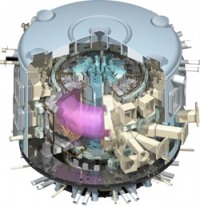Plans to rescue European finance for the Iter fusion project hit the buffers today with the European Parliament refusing to accept pressure from member states to reallocate €1.4 billion from unspent funds.
 |
| A cutaway of Iter's main components |
Iter was the victim of a political gambit in which a request to MEPs from the EU Council of Ministers (representing governments) to allow extraordinary spending on Iter in 2012-3 became tied to a request from MEPs to the council.
MEPs wanted emergency funds for unforeseen events, such as the global economic crisis, to be handled in future by transfers of new money from national capitals to Brussels – in contrast to present EU budget being fixed for seven years at a time.
However, member states on the Council of Ministers, many facing demands to reduce their budgets to slash deficits, rejected this proposal leaving the Iter's finance deal to fall with it. Under EU rules, the unused €1.4 billion will now return to hard-pressed national government treasuries.
European Parliament spokesman Ron Korver told World Nuclear News: "This means the matter will go back to member states. If there is the political will, it's a technical matter to get the money back to Brussels." However, that would have to happen via a special amendment to the 2011 budget, which would be debated early next year. And for that to happen, member states would have to support raising spending in 2011 above an agreed current budget increase of 2.91%. Given that governments such as the UK have said they will refuse to go above that ceiling, a special financing agreement on Iter could be tough to achieve.
Monetary and in-kind contributions to Iter come from all its participating parties: China, India, Japan, Russia, South Korea, the USA and the EU. However, because it benefits from hosting the facility itself, the EU's share of construction costs is 45% of the total and this has more than doubled in the last two years.
Reporting by Keith Nuthall
for World Nuclear News




_47120.jpg)

_23621.jpg)






